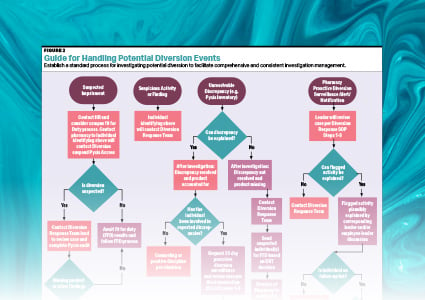- Show Menu
- Contact Us
- FAQs
- Reader Service
- Survey Data
- Survey Winners
- Testimonials
- Upcoming Events
- Webinars
- White Papers
The Role of Nutrition Support in Patients with Cancer
It is not uncommon for patients with cancer to experience loss of appetite throughout the care continuum, leading to weight loss and malnutrition. With prolonged malnutrition, the risk of cancer-induced cachexia is increased. Several factors can lead to malnutrition, including disease, chemotherapy treatment, and psychosocial issues. Throughout treatment, patients are likely to experience any of the following side effects: loss of appetite, constipation and/or diarrhea, dry mouth, lactose intolerance, nausea/vomiting, sore throat, taste changes, and/or cancer-related weight gain. All of these factors can contribute to weight loss and malnutrition.
Although parameters defining malnutrition vary, studies indicate that 30% to 85% of patients with cancer are malnourished.1,2 Nutritional screening often is underperformed, as the primary focus is on treating the underlying disease, so nutrition support personnel may be minimally involved in care.1 This is concerning, given that prolonged malnutrition may lead to increased hospitalizations, may induce higher treatment-related toxicities, can reduce response to treatment, and can lead to overall worse outcomes.3 Thus, it is imperative to identify patients at increased risk of cancer-related malnutrition and provide dietary counseling and parenteral and/or enteral nutrition (PN and/or EN) support. To optimize nutrition support and avoid complications in patients with cancer, pharmacists and dieticians should be directly involved in nutrition-related care. (Throughout this article, the term nutrition support personnel is used to identify nutrition-support pharmacists and dieticians.)
Identifying Patients at Risk of Cancer-Related Malnutrition
Screening Tools
Nutrition support personnel should utilize validated screening tools to identify patients requiring nutritional interventions. Several tools are available to assist in identifying patients at risk for poor nutrition:
- National Risk Index (NRI). The NRI is simple, recommended, and has been validated in various cancers.4-6 The NRI is calculated as 1.519 x serum albumin level [g/L] + 0.417 x current weight/usual weight x 100; results are broken down into no malnutrition (NRI >97.5), moderate malnutrition (NRI 97.5 to 83.5), or severe malnutrition (NRI <83.5).4
- Additional tools have been validated in various trials in patients with and without cancer. These tools include7-12:
- The Simplified Nutrition Assessment Questionnaire (SNAQ)
- Nutritional Risk Screening (NRS) 2002
- SCREEN II
- Malnutrition Universal Screening Tool (MUST)
- Malnutrition Screening Tool (MST)
- Mini Nutritional Assessment (MNA)
Each tool uses multiple methods to assess patients, including questionnaires, body mass index (BMI), disease severity, and/or weight loss over a defined time period. The MNA-Short Form (the abbreviated version of MNA) and the MST have scored >83% and >90% in sensitivity and specificity, respectively, in identifying malnourished patients.7
Patients at Particular Risk
Some patients are more likely to develop malnutrition secondary to their diagnosis. Patients requiring hematopoietic stem cell transplantation and those with head and neck cancer, esophageal cancer, advanced incurable cancers, and patients in the perioperative setting have an increased risk of poor nutritional intake.13,14 These patients often experience treatment-related complications, including mucositis, radiation therapy exposure to the head and neck, chemotherapy-induced nausea/vomiting, tumor obstruction, and surgical interventions that hinder their oral intake.
Other patients at increased risk of developing malnutrition include those with the following conditions:
- GI Malignancies. Patients with GI malignancies and those who undergo extensive bowel resections are at an increased risk for vitamin B12, vitamin D, and calcium deficiencies secondary to impaired absorption.
- Hematopoietic Stem Cell Transplants. Chemotherapy and immunosuppressive therapy for hematopoietic stem cell transplantation patients, such as methotrexate, fluorouracil, vinblastine, dacarbazine, cyclosporine, and tacrolimus, can cause photosensitivity and subsequent vitamin D deficiencies due to minimized sun exposure.
- Cancer-Supportive Therapies. Medications given to support cancer therapies, such as denosumab and zoledronic acid used in prevention of skeletal-related events and hypercalcemia of malignancy, can induce hypocalcemia.
- Electrolyte and Metabolic Abnormalities. Agents such as epidermal growth factor receptor inhibitors, mTOR inhibitors, and tyrosine kinase inhibitors can lead to electrolyte abnormalities (primarily magnesium, potassium, and phosphorus), as well as abnormal cholesterol panels. (Of note, metabolic abnormalities could also arise from treatment-induced hypothyroidism; however, treatment is primarily hormone replacement and is beyond the scope of this article.)
These factors should be considered when assessing patients regarding the complications of poor nutrition. Furthermore, these factors can be used to gain administration buy-in to providing resources for nutrition support personnel on care teams.
Initiating Nutrition Support
Despite established guidelines on optimal management of nutrition in patients with cancer, a wide range of opinions and practices exist among cancer practitioners.3,15-17 Lack of awareness among health professionals of the need for nutrition support in cancer patients has also been reported.18 Unfortunately, these gaps in care have led to reports of patients failing to receive adequate nutrition when appropriate.2 Although the decision to initiate nutrition support in severely malnourished patients is simple, it becomes more complex in patients without a defined period of time for nutrition requirements, in patients with incurable disease, for immunosuppressed patients, and for those who are borderline malnourished.
All patients with cancer should undergo nutritional screening throughout their treatment courses. Early screening provides a baseline value to identify nutritional needs over time. The scoring tools mentioned earlier, which have been validated in the oncology setting, can aid in such screening.7 Counseling regarding adequate dietary intake and supplementation should be provided to all patients with adequate oral intake who are malnourished or at risk for poor nutrition.3 Nutrition support should be initiated in patients with inadequate intake (<60% of caloric requirements) for an expected duration not less than 7 days,14,15,17,19 and malnourished patients should be considered for nutrition support 7 days prior to surgery, as this may improve postoperative outcomes.20
Treatment Safety and Efficacy
Nutrition Counseling
Initiate nutrition counseling as soon as such needs are identified, as there is strong evidence that nutrition counseling in patients with cancer can prevent and reduce malnutrition.21 Counseling should be provided by nutritional support personnel with expertise in appropriate dietary intervention and monitoring in cancer care.3
Nutritional plans should be individualized to meet the needs of the patient, taking into consideration their nutrition status, type and stage of disease, comorbid conditions, and overall medical treatment plan. One study in patients with head and neck cancer undergoing radiation demonstrated that nutritional counseling lead to improvement in anorexia, xerostomia, and dysgeusia. Quality-of-life outcomes were also improved in patients who received nutritional counseling.22
Dietary and Herbal Supplements
Patients with cancer often consider taking supplements and/or adopting a specific diet. However, there is a lack of data supporting any benefits of these methods. To date, no specific diets or dietary supplements have proven superior in patients with cancer, and no compelling evidence exists that any alternative therapies are effective. Moreover, supplements may potentiate drug-drug interactions, leading to decreased efficacy of chemotherapy and/or unwanted adverse effects. At the present time, use of supplements and/or special diets cannot be recommended.
In general, diets including plant-based foods, along with regular exercise and maintenance of a healthy weight, should be encouraged.23,24 Hypocaloric dietary plans (eg, vegan) and short-term starvation are not recommended.25,26 Although short-term starvation has demonstrated increased efficacy of chemotherapy in animal models, it has not been studied in humans. Furthermore, cancer and cancer therapies potentiate a hypermetabolic state in patients, and thus adequate caloric intake is important. However, obese patients may benefit from modest weight loss.
Enteral and Parenteral Nutrition
Patients who are severely malnourished and do not benefit from nutrition counseling should be considered for EN or PN. Data is limited in patients who are borderline malnourished, so this should be avoided for that group. Note that the use of nutritional support in patients who are terminally ill and have an estimated life span of weeks to a few months is not supported and should be avoided.
In general practice, EN is preferred over PN for patients with a functional GI tract. EN is associated with fewer complications and more efficacious reversal of malnutrition; however, EN should be reserved for patients with inadequate oral intake, with the intent of providing ≥60% of daily caloric requirements for at least 7 days.14,17 EN may be delivered via nasogastric/nasojejunal tube or percutaneous routes; data is limited regarding the best route.27,28 For patients requiring long-term treatment, gastrostomy may be preferred as it is easier for patients and caregivers to manage. An important consideration for patients with obstructing tumors is the inability to utilize nasal tubes. Evidence demonstrates that needle catheter jejuno-stomy is the preferred route for these patients.14,17,27
Patients with cancer undergoing surgery for GI malignancies have decreased postoperative complications when receiving EN. In one study, initiating EN in malnourished patients with cancer the morning following surgery resulted in significantly fewer postoperative complications and decreased length of stay.29 However, a smaller trial in patients with pancreatic cancer demonstrated no improvement in postoperative complications.30 At this time, postoperative EN is recommended in patients who are malnourished prior to surgical intervention and in those who cannot initiate oral nutrition within 10 days.20 Prophylactic EN has not demonstrated any advantage in cancer patients.
PN is often reserved for patients who cannot tolerate oral feeding and are not eligible for EN. Because PN use in patients with cancer increases the risk of infections, routine PN use in this group is strongly discouraged.14,15 Avoid PN use in patients with ascites, organ failure, or in hemodynamically unstable patients. Conditions that hinder oral intake, such as severe mucositis, ileus, or intractable vomiting, generally require short periods of PN ranging from 10 to 14 days. PN should be avoided in these patients if the duration is expected to be fewer than 7 days. Long-term nutrition, defined as lasting more than 30 days, should be initiated in patients with GI failure, bowel obstruction, and graft-versus-host disease affecting the GI tract. Patients who have been malnourished for prolonged periods should be monitored closely for refeeding syndrome.
Several studies have demonstrated the benefit of PN in cancer patients; however, other trials show conflicting results. Some evidence demonstrates less postoperative morbidity and fewer noninfectious complications.4,31 However, a large meta-analysis of critically ill or surgical patients (some with cancer) failed to document a significant impact of TPN on either mortality or complication rates.32 Cancer patients initiated on PN must be monitored closely for infectious complications.
Although there is controversy as to when PN is indicated, it is justified in a malnourished patient undergoing cancer surgery when EN is not a viable option, where there is a strong possibility that a patient may be cured of the malignancy or attains a substantial improvement in survival. Nutritional support may improve outcomes in select patients with cancer; each individual must be evaluated by a multidisciplinary team and decisions tailored to specific scenarios.
Conclusion
Malnutrition may occur in a significant percentage of patients with cancer, and it is a major cause of morbidity and mortality in those with advanced disease. The condition is prevalent in patients with GI malignancies, head and neck cancers, and in transplant patients, and is associated with poorer overall survival (in some malignancies), increased chemotherapy-related toxicity, and poorer quality of life.
Due to the paucity of evidence demonstrating benefit in patients who are well nourished or mildly malnourished, nutrition support should be avoided in these patients. Because oral nutritional interventions may improve quality of life, patients with poor oral intake of an expected duration of greater than 7 days, and who are severely malnourished, should be considered for EN or PN therapy; the latter should be tried last. Strong evidence exists to support the use of nutrition therapy in patients undergoing major abdominal surgery, hematopoietic cell transplant patients with severe mucositis or GI manifestations of graft-versus-host disease, and in patients with head and neck cancers.
Nutrition support personnel should be involved in cancer care teams to aid in early identification of patients who would benefit from therapy. Nutrition must be actively managed throughout the continuum of care of cancer patients, as nutritional needs may change over time. Looking ahead, large clinical trials are needed to identify nutritional goals throughout the various cancer care settings.

Kirollos S. Hanna, PharmD, BCPS, BCOP, is a hematology and oncology clinical pharmacist at the Mayo Clinic and the University of Minnesota Medical Center in Rochester, Minnesota. He received his doctorate from Florida A&M University and completed a PGY1 residency at St. Thomas Hospital in Nashville and a PGY2 residency in oncology at St. Luke’s Mountain States Tumor Institute in Boise, Idaho. Kirollos is involved with the Patient-Centered Outcomes Research Institute and the Aplastic Anemia and MDS International Foundation, focusing on patient engagement and patient-centered care in clinical trials and rare diseases. His research interests include stem cell transplantation and the incidence of autoimmune diseases post-transplant.
References
- Bozzetti F, Mariani L, Lo Vullo S, et al. The nutritional risk in oncology: a study of 1,453 cancer outpatients. Support Care Cancer. 2012;20(8):1919-1928.
- Hébuterne X, Lemarié E, Michallet M, et al. Prevalence of malnutrition and current use of nutrition support in patients with cancer. JPEN J Parenter Enteral Nutr. 2014;38(2):196-204.
- Caccialanza R, Pedrazzoli P, Cereda E, et al. Nutritional Support in Cancer Patients: A Position Paper from the Italian Society of Medical Oncology (AIOM) and the Italian Society of Artificial Nutrition and Metabolism (SINPE). J Cancer. 2016;7(2):131-135. doi: 10.7150/jca.13818.
- Veterans Affairs Total Parenteral Nutrition Cooperative Study Group. Perioperative total parenteral nutrition in surgical patients. N Engl J Med. 1991;325(8):525-532.
- Ryu SW, Kim IH. Comparison of different nutritional assessments in detecting malnutrition among gastric cancer patients. World J Gastroenterol. 2010;16(26):3310-3317.
- Kim JY, Wie GA, Cho YA, et al. Development and validation of a nutrition screening tool for hospitalized cancer patients. Clin Nutr. 2011;30(6):724-729.
- Skipper A, Ferguson M, Thompson K, et al. Nutrition screening tools: an analysis of the evidence. JPEN J Parenter Enteral Nutr. 2012;36(3):292-298.
- Wilson MM, Thomas DR, Rubenstein LZ, et al. Appetite assessment: simple appetite questionnaire predicts weight loss in community-dwelling adults and nursing home residents. Am J Clin Nutr. 2005; 82:1074. doi: 10.1177/0148607111414023.
- Keller HH, Goy R, Kane SL. Validity and reliability of SCREEN II (Seniors in the community: risk evaluation for eating and nutrition, Version II). Eur J Clin Nutr. 2005;59(10):1149-1157.
- Stratton RJ, King CL, Stroud MA, et al. ‘Malnutrition Universal Screening Tool’ predicts mortality and length of hospital stay in acutely ill elderly. Br J Nutr. 2006;95(2):325-330.
- Ferguson M, Capra S, Bauer J, et al. Development of a valid and reliable malnutrition screening tool for adult acute hospital patients. Nutrition. 1999;15(6):458-464.
- Nestle Nutrition Institute. MNA mini nutritional assessment. www.mna-elderly.com/forms/mini/mna_mini_english.pdf. Accessed September 22, 2017.
- Bruun LI, Bosaeus I, Bergstad I, et al. Prevalence of malnutrition in surgical patients: evaluation of nutritional support and documentation. Clin Nutr. 1999;18(3):141-147.
- August DA, Huhmann MB, American Society for Parenteral and Enteral Nutrition (A.S.P.E.N.) Board of Directors. A.S.P.E.N. clinical guidelines: nutrition support therapy during adult anticancer treatment and in hematopoietic cell transplantation. JPEN J Parenter Enteral Nutr. 2009;33(5):472-500. doi: 10.1177/0148607109341804.
- Bozzetti F, Arends J, Lundholm K. et al. ESPEN guidelines on parenteral nutrition: non-surgical oncology. Clin Nutr. 2009;28(4):445-454.
- Paccagnella A, Morassutti I, Rosti G. Nutritional intervention for improving treatment tolerance in cancer patients. Curr Opin Oncol. 2011;23(4):322-330.
- Arends J, Bodoky G, Bozzetti F. et al. ESPEN guidelines on enteral nutrition: non-surgical oncology. Clin Nutr. 2006;25:245–259. doi: 10.1097/CCO.0b013e3283479c66.
- Spiro A, Baldwin C, Patterson A. et al. The views and practice of oncologists towards nutritional support in patients receiving chemotherapy. Br J Cancer. 2006;95(4):431-434.
- French Speaking Society of Clinical Nutrition and Metabolism (SFNEP). Clinical nutrition guidelines of the French Speaking Society of Clinical Nutrition and Metabolism (SFNEP): Summary of recommendations for adults undergoing non-surgical anticancer treatment. Dig Liver Dis. 2014;46(8):667-674. doi: 10.1016/j.dld.2014.01.160.
- Weimann A, Braga M, Harsanyi L, et al. ESPEN Guidelines on Enteral Nutrition: surgery including organ transplantation. Clin Nutr. 2006;25(2):224-244.
- Lee JL, Leong LP, Lim SL. Nutrition intervention approaches to reduce malnutrition in oncology patients: a systematic review. Support Care Cancer. 2016;24(1):469-480. doi: 10.1007/s00520-015-2958-4.
- Ravasco P, Monteiro-Grillo I, Marques Vidal P, et al. Impact of nutrition on outcome: a prospective randomized controlled trial in patients with head and neck cancer undergoing radiotherapy. Head Neck. 2005;27(8):659-668.
- Kushi LH, Doyle C, McCullough M, et al. American Cancer Society 2010 guidelines on nutrition and physical activity for cancer prevention: reducing the risk of cancer with healthy food choices and physical activity. CA Cancer J Clin. 2012;62(1):30-67. doi: 10.3322/caac.20140.
- World Cancer Research Fund International. Our Cancer Prevention Recommendations. www.wcrf.org/int/research-we-fund/our-cancer-prevention-recommendations. Accessed September 22, 2017.
- Sierpina V, Levine L, McKee J et al. Nutrition, metabolism, and integrative approaches in cancer survivors. Semin Oncol Nurs. 2015;31(1):42-52.
- Lee C, Raffaghello L, Longo VD. Starvation, detoxification, and multidrug resistance in cancer therapy. Drug Resist Updat. 2012;15(1-2):114-122. doi: 10.1016/j.drup.2012.01.004.
- Bozzetti F. Nutritional support of the oncology patient. Crit Rev Oncol Hematol. 2013;87(2):172-200. doi: 10.1016/j.critrevonc.2013.03.006.
- Bossola M. Nutritional interventions in head and neck cancer patients undergoing chemoradiotherapy: a narrative review. Nutrients. 2015;7(1):265-276. doi: 10.3390/nu7010265.
- Bozzetti F, Braga M, Gianotti L, et al. Postoperative enteral versus parenteral nutrition in malnourished patients with gastrointestinal cancer: a randomised multicentre trial. Lancet. 2001;358(9292):1487-1492.
- Martignoni ME, Friess H, Sell F, et al. Enteral nutrition prolongs delayed gastric emptying in patients after whipple resection. Am J Surg. 2000;180(1):18-23.
- Fan ST, Lo CM, Lai EC, et al. Perioperative nutritional support in patients undergoing hepatectomy for hepatocellular carcinoma. N Engl J Med. 1994;331(23):1547-1552.
- Heyland DK, MacDonald S, Keefe L, et al. Total parenteral nutrition in the critically ill patient: a meta-analysis. JAMA. 1998;280(23):2013-2019.
Like what you've read? Please log in or create a free account to enjoy more of what www.pppmag.com has to offer.








